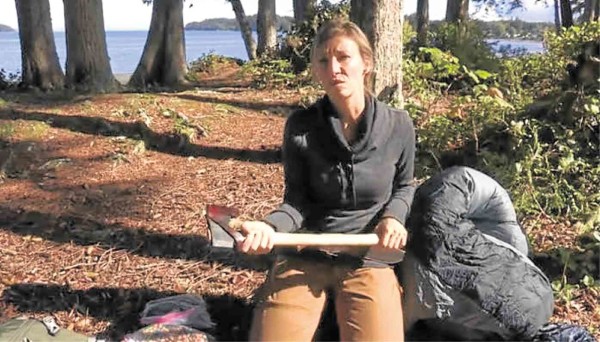Woman survives the wild, all by her lonesome, in ‘Alone’
It’s become commonplace these days for survival-themed reality shows to maroon willing souls and test their skills in the wild, but the 13-episode “Alone” (Thursdays, 9 p.m., History Channel) is like no other, according to one of its participants.
“The show is really different from others in that you are completely alone—I had no camera crew with me,” American Nicole Apelian revealed to the Inquirer in a phone interview, while she was in Portland, Oregon.
“I think everyone was just in competition with themselves,” she elaborated on her fellow castaways, the most enduring of whom will win a cash prize of $500,000.
There were 10 people who got stranded on Vancouver Island in Canada, she related. “We had a week of camera training together and we were individually dropped by seaplane, boat and helicopter on the island. We had no communication with anyone else from the show.”
Apelian, 45, is a former field biologist and a game warden with the US Peace Corps for a time. Her previous experiences, she related, prepared her for her stint in the second season of “Alone,” where she was required to record her time on the island.
Article continues after this advertisementExcerpts from the interview:
Article continues after this advertisementTell us about your experience with tracking lions.
In the 1990s, I decided to join the Peace Corps and I moved to Botswana. After that stint ended, I loved Botswana so much and there was an opportunity for me to stay and work doing lion research, [so] I ended up doing a 10-year study of lions. I lived in a tent for a very long time. I started learning about tracking, nature connection and bird language… From there, I got to know a group of San Bushmen. Over the years, they taught me so much about not just hands-on, physical survival skills of how to make fire and how to find food, but also mental survival skills of how to get along with others.
How often were your close encounters with lions?
I’ve been charged by lions in Africa; I’ve been charged by hippos, elephants, buffalo… there’s a whole list. Where I lived, it was in a bush camp, and I was living in their territory. So there would be African lions almost every night, coming to the camp… and elephants, snakes. So it really made you aware of your surroundings. I was able to use those skills of awareness that I’d learned in Africa on Vancouver Island.
How big was the area allowed for the show?
The area was quite large. We were on the northwest corner where there are very few inhabitants. The weather there is really harsh. And there was no way that I ever would have been able to hear or even run into anyone else in the show. We were placed far enough away from each other and the terrain was quite unforgiving.
What animals were on this island? Did some of them end up as food?
Around the island, there are lots of bears, cougars, wolves, mink, deer, elk… A lot of wildlife out there, a lot of fowl—geese and duck—and squirrels, eagles and salmon. For you to survive, some animals… have to end up as food. We definitely weren’t vegetarians out there.
How would you describe the entertainment value of the show?
High. I was addicted. I watched Season 1 and I just couldn’t wait for the next week to come… It’s a show that the entire family can watch, kids included. Everybody will learn from it.
How did you set up the six cameras?
One of the things that [viewers] would miss is how difficult it was for each of us to do the camera work. I’m not a videographer. I had two trail cameras and four handheld cameras—in order to film myself from different angles. Not only are you surviving in this harsh environment; you also have to film yourself doing it in a way that the audience is going to see what you went through. You’re lacking in calories, [but] you have to go set up a camera, walk back and retrieve it!
